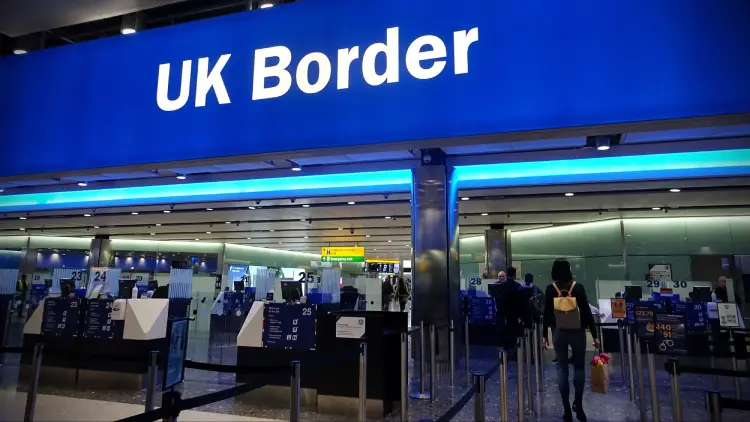
Britain’s new points-based post-Brexit immigration system is designed to attract the “brightest and best from around the world”, according to home secretary Priti Patel. But as new barriers to entry for European workers are introduced, will the visa regime make the UK less attractive to the next generation of technology talent?

The new system, which came into force on January 1, requires anyone applying for a visa to obtain 70 points, which are awarded for things such as having a job offer from an approved employer and being able to speak English. Bonus points are on offer for those with a high-level qualification, such as a PhD in a STEM subject, as well as those taking jobs where the UK has a skills shortage.
Until now, workers from the European Union have been able to move to the UK without a visa, but with freedom of movement abolished as part of Brexit they will now have to follow the same routes as workers from other countries.
European workers are the big losers from these changes, says Pat Saini, head of immigration at law firm Pennington Manches Cooper. “If you’re a company looking at two candidates, one from Berlin and one from Silicon Valley, you will broadly have to jump the same hoops to hire either of them,” she says.
For UK employers, it will also limit the supply of technology talent from the continent. “From the candidate’s perspective, it will be easier for a European to go to Paris or Berlin because you can no longer just hop on a train and come to London,” Saini argues.
Remote work depends on data adequacy ruling
Given these lengthy visa applications, companies seeking global talent may be tempted to avoid moving workers to the UK at all, and take advantage of the trend for remote working and distributed teams accelerated by the Covid-19 pandemic.

“You don’t have to worry about new immigration regimes if you’re not going anywhere. says Tom Rathborn, who heads the Brexit advisory team at Grant Thornton. “The challenge is that at the moment we don’t know how it will play out, and whether people will want to stay remote or go back to the office. But it certainly takes the pressure off a lot of companies.”
However, the long-term viability of UK employers hiring remote workers in the EU depends on the so-called ‘data adequacy’ agreement between the two parties. The EU has yet to decide whether the UK’s data protection regime offers sufficient security to allow data from the member states to be shared with Britain. The free trade agreement signed on December 30 permits data flow between the UK and EU for the next six months, by which time the European Commission will have reached a decision.
If you’re looking at two candidates, one from Berlin and one from Silicon Valley, you will broadly have to jump the same hoops to hire either.
Pat Saini, head of immigration, Pennington Manches Cooper
Though the UK is committed to maintaining the EU’s GDPR around data, Rathborn says it is “not a done deal” that adequacy will be granted. The EU has previously raised concerns about several issues including the way the UK shares data with the US government.
If the EU decides that the UK’s data protection regime is not adequate, UK businesses that wish to share data with EU-based staff may need to introduce costly new protections. “Businesses need to double-check their data agreements, internally as well as externally,” Rathborn says. “They need to think about protocols that are in place and whether they do the job they are supposed to do.
“Businesses shouldn’t be afraid of this issue, there are steps they can take to protect themselves.”
Surge in ‘global talent’ visa applications expected
The new points system is not the only way for EU digital talent to work in the UK, however. The ‘global talent visa’ is available to exceptional figures in sectors including digital. Successful tech applicants require an endorsement from Tech Nation, which vets applications on behalf of the government.
Most applicants for the visa typically come from the US or Asia, with only a small number from non-EU European nations, but Matt Jeffs-Watts, head of visas at Tech Nation, says it experienced an explosion in popularity ahead of Brexit.
“November was a record month, the number of applications was off the charts,” he says. “The main driver was the changes to the immigration system and people wanting to get their applications in before the end of the year.”
Though the number of people using this route is relatively small – Tech Nation approved 1,523 applications in the year to April 2020 – Jeffs-Watts says they are anticipating unprecedented growth in 2021. “If you removed the EU, we’d be looking at 40%-50% growth anyway, but adding that in we could see anything up to 100%,” he says.
Saini believes a review of visa categories for entrepreneurs is necessary. Last year, the UK government scrapped its entrepreneur visa, replacing it with the start-up and innovator route, which requires applicants to have an endorsement from an approved body such as an accelerator or university. But Saini believes this visa route discourages some experienced entrepreneurs, who are in demand around the world, particularly as many of the endorsing bodies will ask for an equity stake in the business.
“These experienced entrepreneurs are the kind of people whose innovative ideas and experience the UK should be trying to attract in the post-Brexit world, instead of being made to present their ideas and give up equity,” she says. “I think we’ve missed a trick with these global entrepreneurs because we’re effectively turning them away. The government line so far has been that such individuals should use the global talent visa, but this isn’t always a good fit.”
But Jeffs-Watts is confident the new post-Brexit immigration system will not dent the UK’s appeal to tech workers planning to head across the channel, pointing out many will qualify for visas as highly skilled workers under the points-based system.
“Places like London, Cambridge and Oxford and other hubs around the country such as Edinburgh are always going to be attractive for tech workers from around the world,” he says. “I don’t think [Brexit] changes that.”






